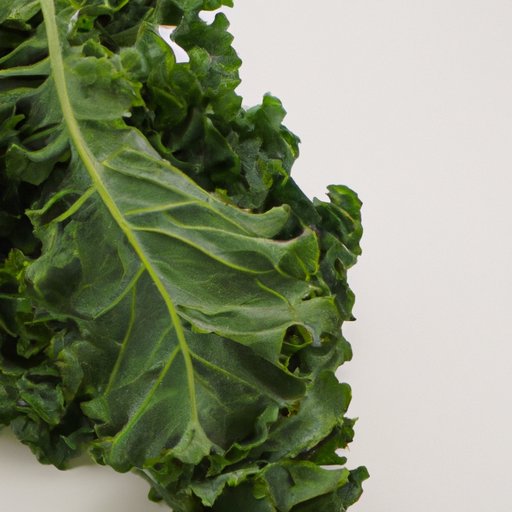Introduction
Kale is a cruciferous vegetable that has been gaining popularity in recent years due to its impressive health benefits. It has a slightly bitter taste and a crisp texture and can be eaten raw or cooked. It is high in vitamins, minerals, and fiber, and is low in calories, making it an excellent choice for those looking to improve their overall health.
In this article, we’ll explore the various health benefits of kale and how it can help improve your overall health. We’ll cover its nutritional value, its role in improving heart health, digestion and immunity, reducing the risk of cancer, fighting inflammation, aiding in weight loss, and its effects on skin, hair, and nail health.
The Nutritional Value of Kale
Kale is an incredibly nutritious vegetable that is packed with vitamins, minerals, and fiber. It is an excellent source of vitamin C, vitamin K, and beta carotene, as well as calcium, potassium, magnesium, and iron. It also contains phytonutrients such as lutein and zeaxanthin, which can help protect against age-related vision problems.
In terms of calorie content, kale is quite low. One cup of cooked kale contains just 36 calories, making it an ideal food for those trying to lose or maintain weight.

The Benefits of Eating Kale for Heart Health
Kale is known for its ability to lower cholesterol levels and improve overall heart health. Studies have shown that consuming kale regularly can reduce LDL (bad) cholesterol by 10% and increase HDL (good) cholesterol by 27%. This is due to the high amounts of fiber and antioxidants found in kale.
Kale is also beneficial for those with high blood pressure. It contains potassium, which helps to regulate blood pressure, and its high fiber content helps to reduce inflammation and improve circulation, both of which can help reduce blood pressure.

How Kale Can Help Improve Digestion and Immunity
Kale is high in fiber, which helps to promote healthy digestion. Fiber helps to keep the digestive system running smoothly, and can help to prevent constipation and other digestive issues. In addition, fiber helps to keep you feeling fuller longer, which can help with weight management.
Kale is also rich in antioxidants, which can help to strengthen the immune system. Antioxidants help to fight off free radicals, which can damage cells and lead to disease. Regular consumption of kale can also help to reduce inflammation, which can further boost immunity.
Kale’s Role in Reducing the Risk of Cancer
Kale is rich in antioxidants, which can help to reduce the risk of certain types of cancer. One of these antioxidants, sulforaphane, has been shown to help reduce the growth of certain types of cancer cells. Additionally, kale is high in fiber, which has been linked to a decreased risk of colorectal cancer.
Kale can also help to detoxify the body, which can help reduce the risk of cancer. Kale is high in chlorophyll, which binds to toxins and prevents them from being absorbed into the body. This can help to reduce the amount of potentially carcinogenic substances in the body.
The Anti-Inflammatory Effects of Kale
Kale is high in omega-3 fatty acids, which can help to reduce inflammation in the body. Inflammation is linked to a variety of illnesses, including arthritis, diabetes, and heart disease, so reducing inflammation can help to reduce the risk of these diseases. Additionally, studies have shown that consuming kale can help to reduce markers of inflammation in the body.
Kale may also help to fight diabetes. Studies have shown that consuming kale can reduce fasting glucose levels, which can help to control diabetes. Additionally, the fiber found in kale can help to slow the absorption of sugar, which can help to keep blood sugar levels stable.
Kale’s Role in Weight Loss and Maintenance
Kale can be a great tool for those trying to lose or maintain weight. Its low calorie content makes it an excellent option for those looking to cut back on their caloric intake. Additionally, the fiber found in kale can help to keep you feeling fuller longer, which can help to reduce cravings and overeating.
Kale is also high in iron, which can help to boost metabolism. Iron helps to transport oxygen to the cells, which can help to speed up the metabolic process and burn more calories. Additionally, the fiber found in kale can help to curb appetite and reduce cravings, making it easier to stick to a healthy diet.
Kale’s Benefits for Skin, Hair and Nail Health
Kale is rich in vitamin A, which can help to improve skin health. Vitamin A helps to boost collagen production, which can help to reduce wrinkles and make skin look smoother and younger. Additionally, vitamin A helps to protect skin from sun damage, which can help to reduce the risk of skin cancer.
Kale is also beneficial for hair and nail health. The vitamins and minerals found in kale can help to strengthen hair and nails, making them less prone to breakage. Additionally, the antioxidants found in kale can help to protect hair and nails from oxidative damage, which can help to keep them looking healthy and strong.
Conclusion
Kale is an incredibly nutritious vegetable with numerous health benefits. It is high in vitamins, minerals, and fiber, and is low in calories, making it an excellent choice for those looking to improve their overall health. Kale can help to reduce cholesterol levels and improve heart health, aid in digestion and immunity, reduce the risk of cancer, fight inflammation, aid in weight loss, and improve skin, hair, and nail health.
(Note: Is this article not meeting your expectations? Do you have knowledge or insights to share? Unlock new opportunities and expand your reach by joining our authors team. Click Registration to join us and share your expertise with our readers.)
